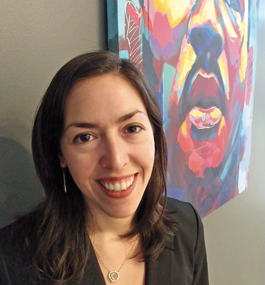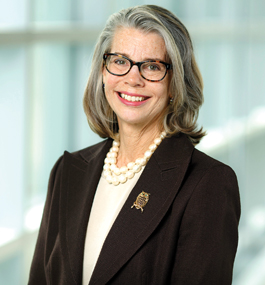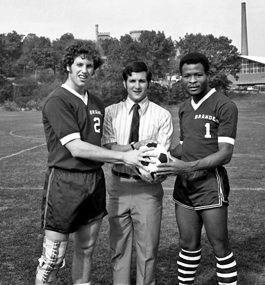Impact

Laura Wolf ’08
A Fellowship to Expand Equal Opportunities for Women
Laura Wolf ’08, a Denver-based civil rights and employment discrimination attorney, has established a fellowship supporting Brandeis students who pursue unpaid internships focused on women’s rights and women’s education.
Created by a $15,000 gift from Wolf, the Dorothy Shapiro Fellowship in Women’s Rights and Women’s Education will provide $5,000 stipends to three Brandeis students over the next few summers through the Hiatt Career Center’s World of Work internship funding program.
The fellowship is named for Wolf’s grandmother, Dorothy Shapiro, whose parents could afford to send only one of their children to college. So they sent her brother.
Wolf, a Harvard Law School graduate, has made equal opportunity her life’s mission. She helped draft Colorado’s landmark Equal Pay for Equal Work Act, which went into effect last year. The law prevents employers from paying one employee less than another for substantially similar work if the pay disparity is based on sex, and requires employers to advertise salary ranges.
“It’s doing wonders to close the pay gap,” says Wolf. “The onus is now on the employer to think proactively about what’s really driving compensation decisions.”
Wolf, who entered Brandeis knowing she wanted to go to law school, says a senior-year internship reviewing Massachusetts Commission Against Discrimination case files solidified her interest in employment discrimination law.
“It opened my eyes,” she says. “If someone was terribly mistreated in their job and they weren’t a member of a protected class, they would have no case in court.”
Around the same time, Wolf learned her mother, a single parent to Wolf and her brother, had been pushed out of a job after having her first child. Wolf’s mom brought her case to the U.S. Equal Employment Opportunity Commission, received a rare probable-cause finding and ultimately secured a settlement.
After law school, Wolf joined a prominent Denver civil rights firm, where she eventually became a partner. She opened her own firm, Spark Justice Law, in May 2020, meeting with clients via Zoom from her home for the first year — “a good way to save on overhead,” she says — and taking on many cases resulting from the pandemic, from severance reviews in COVID-related layoffs to obtaining reasonable accommodations for the immunocompromised. As she was opening her firm, the Colorado Bar Association honored her with its Gary McPherson Outstanding Young Lawyer of the Year award.
Wolf, whose voice turns giddy upon mention of her idol, Ruth Bader Ginsburg, spends as much as three hours each week talking with law students seeking mentorship and connections.
“It’s really hard to stay on the civil rights track,” she explains. “I don’t want interested students to slip out of our fingers.”
While a career in civil rights law is not for the fainthearted, Wolf is a self-proclaimed eternal optimist. She celebrates how far the effort to secure equal pay for equal work has come.
“But there’s still an endless amount of work to do when it comes to building women up,” she says. “I’m hopeful the Dorothy Shapiro Fellowship will allow Brandeis students to pursue an internship doing just that.”
— Alexandra Stephens
To learn how you can support World of Work internships, email giving@brandeis.edu or call 781-736-4000. Read more about the work of current WOW recipients, including the Dorothy Shapiro Fellow.

Hannah Peters
The Power of a Chair
At an event in New York City in spring 1948, Reba Richter, a woman with lofty ambitions, the widow of prominent industrialist and philanthropist Max Richter, approached President Abram Sachar about her interest in shaping the academic strength of Brandeis University, which was still in its planning stages.
Within the year, the university had announced its first endowed professorship: the Max Richter Chair of Political Science. The gift was arranged through a pivotal assist from the Richters’ estate attorney, Charles Segal, G’74, G’77, GG’21, later a Brandeis fellow, whose two grandchildren and a great-granddaughter would go on to graduate from the university.
An endowed chair, or professorship, is the highest accolade a university can give its distinguished faculty and rising stars. Across all higher-education institutions, it is the gold standard for recruitment and retention, establishing the holders as leaders in their fields. Case in point: Stephen J. Whitfield, GSAS PhD’72, the Max Richter Professor of American Civilization, Emeritus, and de facto historian of the Brandeis story.
Gifts establishing endowed chairs advance research and expand scholarly horizons for undergraduates and graduate students alike, and are typically named for the donor, an inspirational family member, a public figure or a faculty member. At Brandeis, the latter demonstrates an important truth: Here, faculty are revered for their incomparable teaching and devotion to students, often described as the hallmark of the Brandeis experience.
Chair holders such as Peter Petri, founding dean of Brandeis International Business School; University Professor Eve Marder ’69; and Nobel Laureate Michael Rosbash, to name only a few, serve to burnish Brandeis’ academic renown.
Each endowed professorship makes an indelible impact on the vibrant scholarship taking place at the university. Chair gifts are transformative, and every gift to Brandeis is important and meaningful.
We are thankful for your kind support. My door is always open to hear where the pull of your generosity to Brandeis leads.
Gratefully,
Hannah Peters
Interim Senior Vice President of Institutional Advancement

A new Gosman study lounge will be named in memory of former soccer captain Barry Harsip ’73 (left).
Giving Athletes a Place to Study
Barry Harsip ’73 was the prototypical student-athlete. A varsity soccer captain at Brandeis, he believed hard work and discipline were the key to success, both on the field and in the classroom. That’s why, when he passed away in 2020, his loved ones decided the best way to honor him would be to help current and future student-athletes excel.
So Harsip’s wife, Lisa, and a few of his friends and former teammates partnered with Brandeis to build the Barry Harsip Student Lounge. Located in the Gosman Sports and Convocation Center, where student-athletes spend much of their time, the lounge will function as a place for students to study and unwind.
“College life is very busy for varsity athletes, and strong time management is essential,” says Jeffrey Bender ’75, one of Harsip’s teammates and himself a former soccer captain. “The student lounge will help athletes attend to their academic assignments in between their athletic responsibilities.”
Currently, student-athletes study in whatever space they can find in Gosman, doing their best to drown out the noise around them, or they hustle between the gym and the library.
“It will be so helpful to have somewhere to study before and after practice, without having to spend a lot of time walking around campus to find a spot,” says Sydney Lenhart ’24, a member of the women’s soccer team. “I really like the idea of having a designated space in the building rather than having to study near a busy staircase.”
In summer 2021, Lisa; Bender; former teammates John Fobia ’73, Mark Volk ’74 and David Goodman ’74; and friend Mark Scheier pledged more than $80,000 to make the student lounge a reality. This spring, the organizers helped raise an additional $23,370 (as of early May) through a crowdfunding campaign, ensuring the lounge would truly be a fitting memorial to Harsip.
Now construction is underway, and the lounge is slated to open to all Judges in August.
